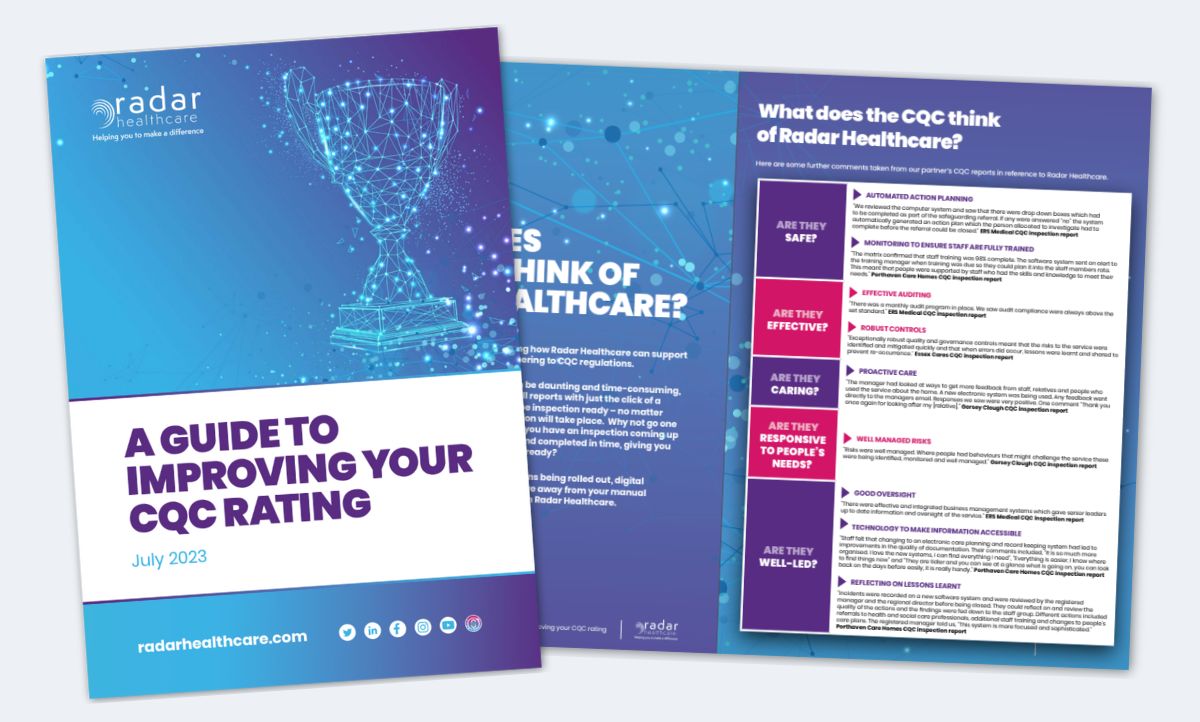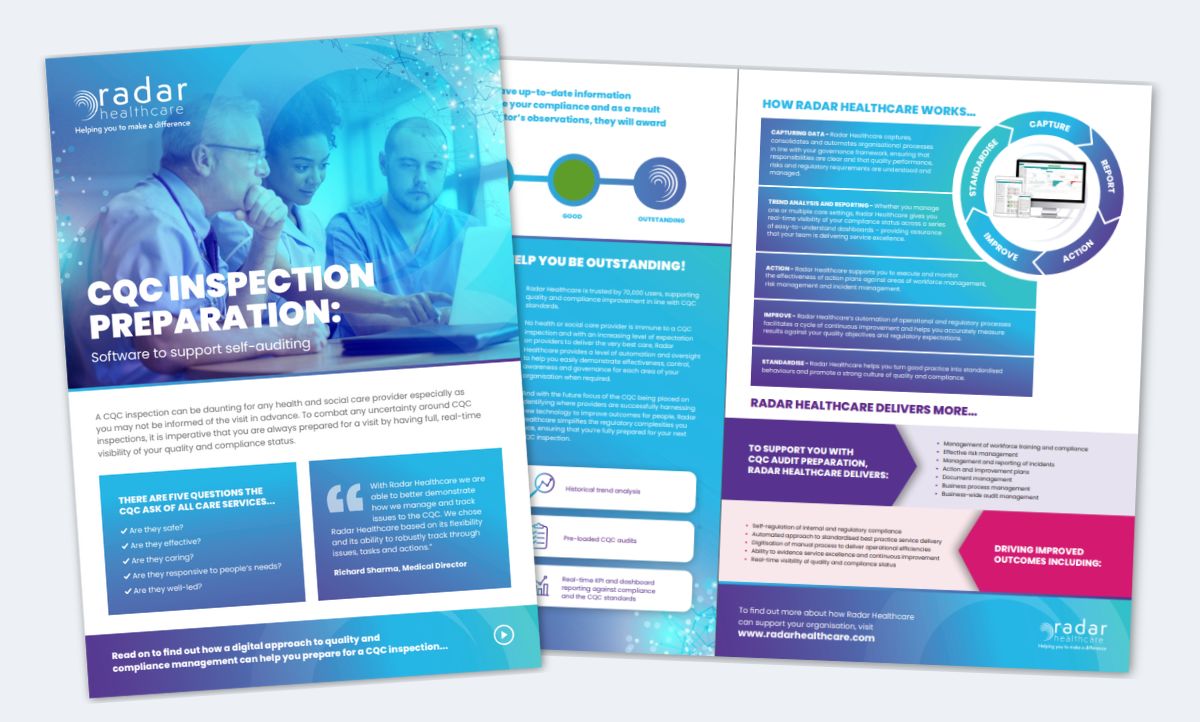What are the 5 CQC standards?
Tags:
What are the 5 CQC standards? Everything You Need to Know
The Care Quality Commission (CQC) plays a pivotal role in ensuring the quality of health and social care services in England. As an independent regulator, the CQC monitors, inspects, and regulates various health and social care organisations, enabling the public to make informed choices about their care providers. To gauge the quality of these services, the CQC utilises a rating system consisting of four categories: outstanding, good, requires improvement, and inadequate. These ratings serve as indicators of the organisation’s performance and help the public make decisions aligned with their needs.
The CQC’s assessment process is guided by 5 CQC Standards. In this blog, we delve into each of these standards, providing insight into their significance, the criteria they encompass, and how healthcare organisations can leverage technology, such as Radar Healthcare, to excel in these areas.
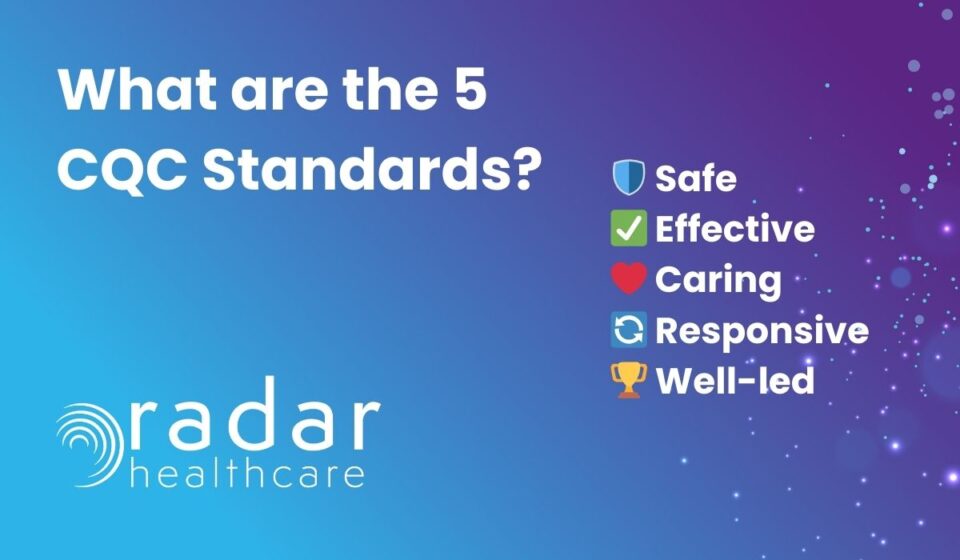
"Moving from an ‘Inadequate’ to a ‘Good’ CQC rating in such a short period of time is a significant achievement and the implementation of Radar Healthcare has been instrumental in this. We have an overall picture of the quality of care we are delivering; we can see where things are going wrong but more importantly, we have access to data and information which helps us prevent things from going wrong in the first place.
It has provided the team and the CQC with confidence that we now have the systems in place to deliver the highest standard of care."
What are the 5 CQC Standards?
Standard 1️⃣: Safe
Protecting Against Harm and AbuseEnsuring the safety of both patients and staff is paramount in any healthcare setting. The CQC’s Safe standard evaluates the organisation’s commitment to safeguarding individuals from abuse, negligence, and preventable harm. It encompasses several critical aspects:
- Safeguarding from Abuse: How does the organisation prevent and address abuse, harassment, and discrimination?
- Risk Management: How are risks assessed, monitored, and managed to maintain a safe environment?
- Proper Medication Use: How is the correct and safe administration of medications ensured?
- Infection Control: What measures are in place to prevent and control infections within the facility?
- Learning from Mistakes: How does the organisation learn from incidents and implement improvements?
Standard 2️⃣: Effective
Achieving Positive OutcomesThe Effective standard focuses on the quality and outcomes of care, emphasizing evidence-based practices and positive results. Key considerations include:
- Evidence-Based Care: Is care aligned with legislation and supported by credible guidance?
- Staff Competence: How does the organisation ensure that staff possess the knowledge and skills to provide effective care?
- Collaborative Care: How effectively does the organisation collaborate across teams to deliver optimal care?
Standard 3️⃣: Caring
Compassionate TreatmentThe Caring standard centers on treating individuals with compassion, kindness, dignity, and respect. This standard includes:
- Emotional Support: How does the organisation provide emotional support and kindness to individuals?
- Involving Patients: How are individuals actively engaged in making decisions about their care?
Standard 4️⃣: Responsive
Meeting Individual NeedsThe Responsive standard assesses the organisation’s ability to tailor services to meet the unique needs of individuals. It encompasses:
- Handling Concerns and Complaints: How effectively are concerns and complaints managed to improve care quality?
- Service Organisation: How well are services organised to meet diverse needs?
Standard 5️⃣: Well-led
Effective Leadership and GovernanceThe Well-led standard evaluates the leadership, management, and governance practices of the organization. This standard emphasises:
- Positive Culture: Does the organisation promote a positive culture that encourages learning, innovation, and fairness?
- Clear Responsibilities: Are responsibilities well-defined, and is quality performance effectively managed?
- Stakeholder Engagement: How are individuals engaged and involved in shaping the service?
- Continuous Improvement: How does the organisation continuously learn, improve, and innovate?
"They were impressed with our systems. The CQC looks at audits, incidents, and complaints in a lot of detail and having these items in a place where you can explain what happened, how it was resolved, what were the issues and what were the learnings is invaluable."
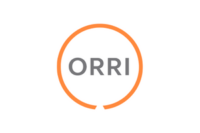
Leveraging Technology for CQC Success
Meeting these CQC standards can be challenging, but advanced technology solutions like Radar Healthcare can streamline processes and enhance compliance. Here’s how:
📋 Evidencing Compliance: Radar Healthcare’s software centralises incident reporting, audits, and risk management, making it easier to evidence safe and effective care delivery.
📈 Action Plans: The platform allows organisations to create and track action plans based on incidents, audits, and risk assessments, supporting continuous improvement.
🗣️ Feedback Collection: Radar Healthcare enables easy collection of feedback, helping organizations respond to concerns and actively engage with patients’ needs.
🎓 Customisable Training: The platform ensures staff receive the necessary training and support to deliver safe, effective, and responsive care.
🤝 Collaboration and Communication: Radar Healthcare promotes collaboration among teams and facilitates communication, ensuring that all aspects of care are addressed.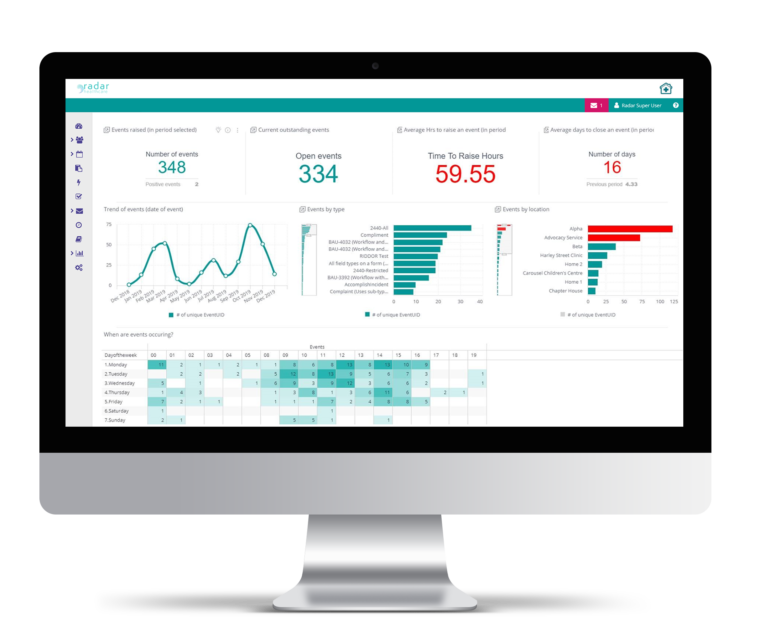
Conclusion
The 5 CQC Standards serve as a comprehensive framework for evaluating health and social care organisations’ performance and ensuring the delivery of high-quality care. By aligning practices with these standards and utilising technology solutions like Radar Healthcare, health and social care organisations can enhance their ability to meet patients’ needs, achieve positive outcomes, and consistently deliver safe, effective, and compassionate care. In doing so, they contribute to an improved quality of life for service users and support the overall health and well-being of their communities.
Book a free demo today CQC FAQs
The Care Quality Commission (CQC) is an independent regulator of health and social care services in England, ensuring high standards of care.
CQC standards ensure that healthcare services are safe, effective, caring, responsive, and well-led, promoting high-quality care for all individuals.
Organisations can improve their CQC rating by aligning their practices with CQC standards and using technology solutions like Radar Healthcare to enhance compliance and efficiency.
Technology helps streamline processes, centralise data, ensure compliance, and facilitate continuous improvement, making it easier to meet and maintain CQC standards.
The frequency of inspections varies based on the service’s rating and risk level, with higher-risk services being inspected more frequently.


